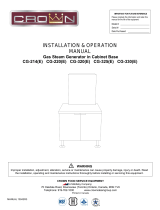
INSTALLATION AND OPERATION MANUAL, OYSTER BAR, GAS BOILER,
MODELS OB-2-1-27-G, OB-2-2-27-G, OB-4-1-48-G, OB-4-2-54-G
PART NUMBER 10104R1 4 2005-05-11
GENERAL
Direct steam jacketed kettle(s) are pressure vessels of a double wall stainless steel
construction forming a steam chamber (jacket) enveloping the lower kettle bowl surface.
Mounted on a modular cabinet base housing a gas boiler designed to ASME Code and
approved as a steam heating boiler restricted to operation at pressure not to exceed 15 psi.
The gas boiler may be in a 27 inch, 48 inch or 54 inch cabinet base rated at 140,000 or 200,000
BTU, 48 inch or 54 inch cabinet base rated at 200,000, 250,000 or 300,000 BTU, operational on
Natural or Propane Gas. Boilers provided with optional electronic ignition and CSD1 controls.
All models are suffixed with either -1 or -2 to indicate the capacity of the kettle in quarts.
1.0 INSTALLATION INSTRUCTIONS
UNPACKING
Immediately after unpacking, check for possible shipping damage. If the appliance is found to
be damaged, save the packaging material and contact the carrier within 15 days of delivery.
Before installing, verify that the gas (natural or propane), the elevation from sea level and the
electrical supply agree with the specification on the data plate. NOTE: If this appliance is being
installed above 2000 feet altitude, contact your authorized service office to assure that the
proper orifice size for your elevation has been installed.
LOCATION
The installation location must be kept free and clear of combustibles. Do not obstruct the flow
of combustion and ventilation air. Clearance from combustible construction must be a minimum
of 3 inches from the sides and 6 inches from the back. The appliance should be installed on a
noncombustible floor. Provide adequate clearances for cleaning, maintenance, service and
proper operation.
Sufficient air should be allowed to enter the room to compensate for the amount of air removed
by any ventilating system and for combustion of the gas burners. Do not obstruct the air flow
into and around the appliance. Do not obstruct the flow of flue gases from the flue duct located
at the rear and above the cabinet. Position the appliance in its final location. Check that there
are sufficient clearances to service the controls, for door swings, etc., and to make the required
supply and drain connections.
Allow enough space between any other piece of equipment or a wall for service access.
Service on the cabinet base may require access to the left and/or right side panels.





















